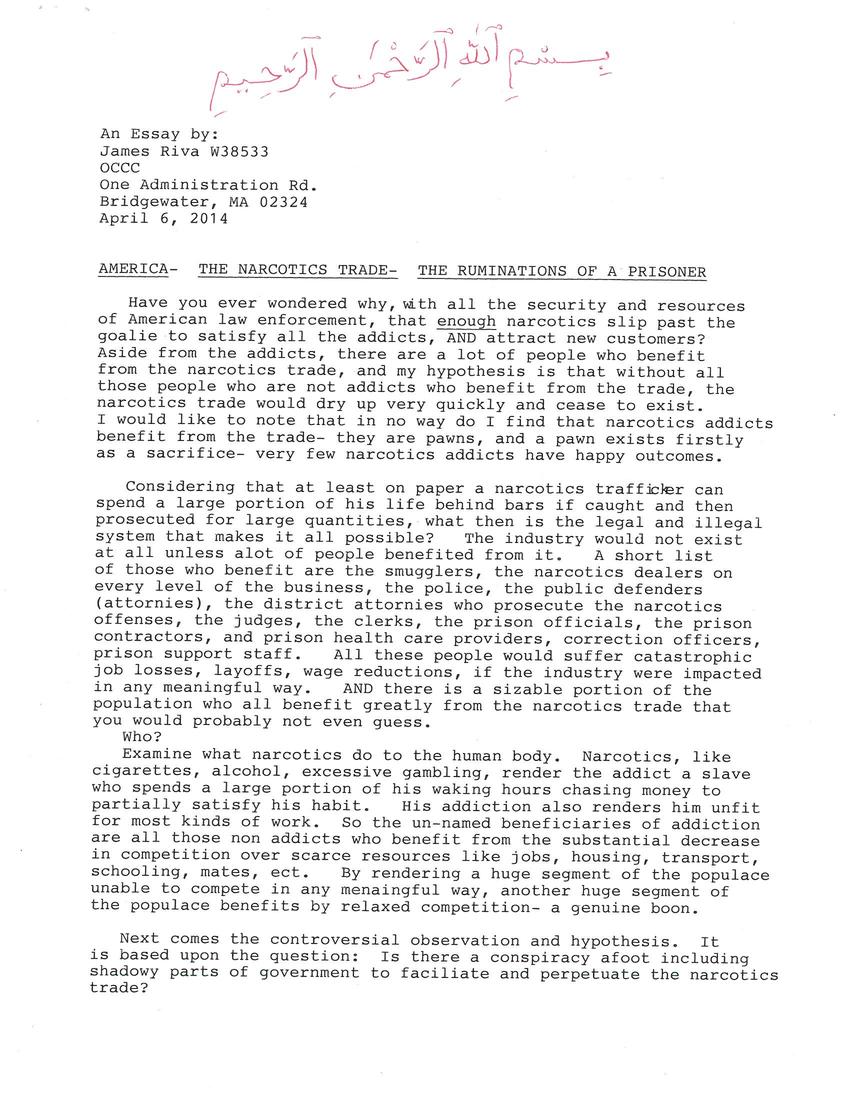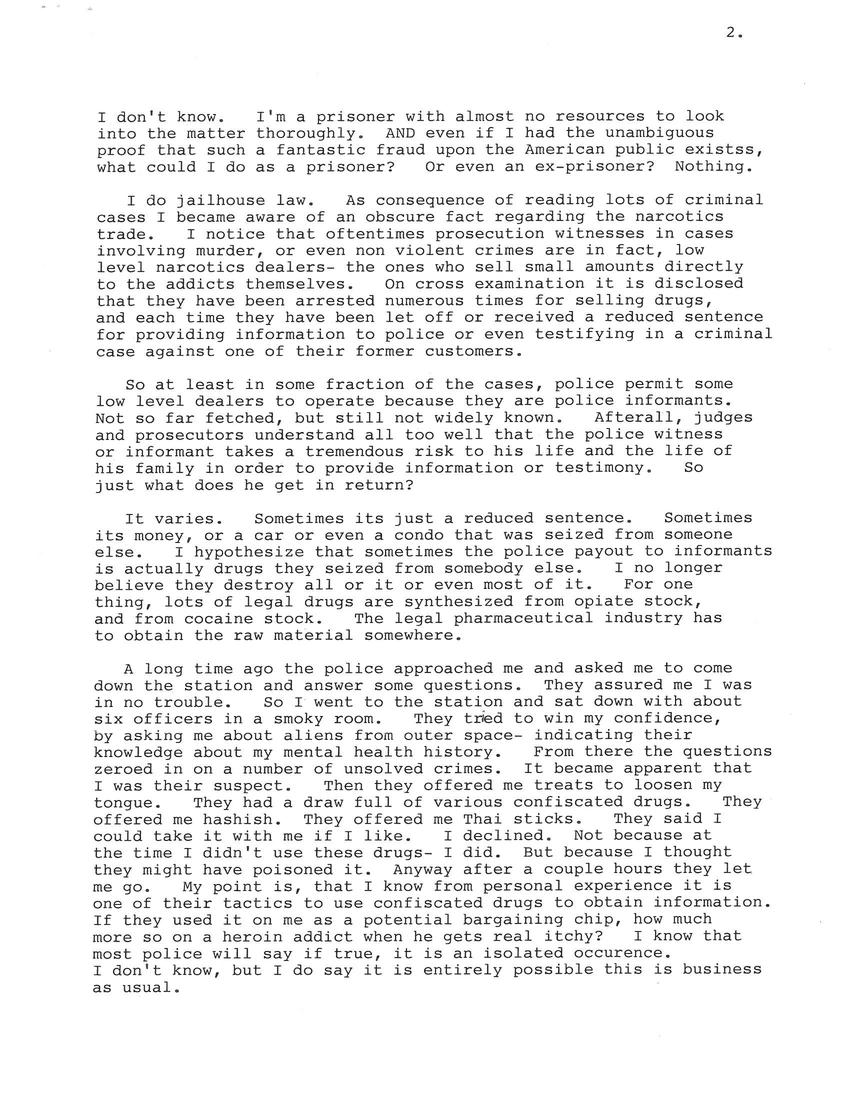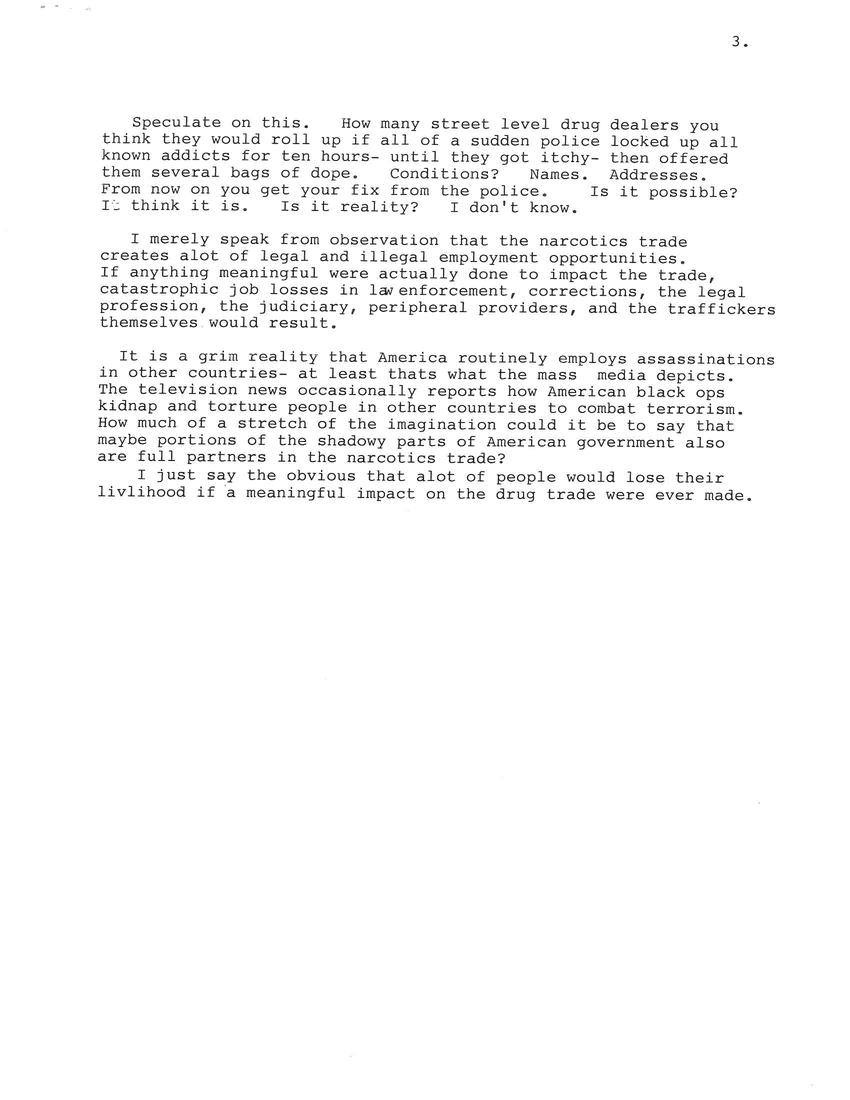
Transcription
James Riva W38533
OCCC
One Administration Rd.
Bridgewater, MA 02324
April 6, 2014
America: The Narcotics Trade
The Ruminations of a Prisoner
Have you ever wondered why, with all the security and resources of American law enforcement, that enough narcotics slip past the goalie to satisfy all the addicts AND attract new customers? Aside from the addicts, there are a lot of people who benefit from the narcotics trade, and my hypothesis is that without all of the non-addicts whom benefit from the trade, the narcotics trade would dry up very quickly and cease to exist.
I would like to note that I in no way find that narcotics addicts benefit form the trade. They are pawns. A pawn exists firstly as a sacrifice. Very few narcotics addicts have happy outcomes.
Considering that a narcotics trafficker can spend a large portion of his life behind bars if caught and then prosecuted for large quantities, what then is the legal and illegal system that makes it all possible? The industry would not exist at all unless a lot of people benefited from it. A short list of people who benefit are: smugglers, narcotics dealers on every level of the business, police, public defenders (attorneys), D.A.s who prosecute narcotic offenses, prison health care providers, correctional officers, and prison staff. All these people would suffer catastrophic job loss, layoffs, and wage reductions if the industry were impacted in any meaningful way. AND there is a sizable portion of the population who all benefit greatly that you would probably not even guess.
Who?
Examine what narcotics do to the human body. Narcotics, like cigarettes, alcohol, excessive gambling, render the addict a slave who spends lots of his waking hours chasing money to partially satisfy his habit. His addiction also renders him unfit for most kinds of work. So the unnamed beneficiaries of addiction are all those non-addicts who benefit from the substantial decrease in competition over scarce resources like jobs, housing, transportation, schooling, mates, etc. By rendering a huge segment of the populace unable to compete in any meaningful way, another segment of populace benefits from the relaxed competition. A genuine boon.
Next comes the controversial observation and hypothesis. It is based on the question: Is there a conspiracy afoot that has shadowy parts of the government facilitate and perpetuated the narcotics trade?
I don't know. I'm a prisoner with almost no resources to look into the matter thoroughly. AND even if I had, the unambiguous proof that such a fantastic fraud on the American public exists. What could I do as a prisoner? Or even as an ex-prisoner? Nothing.
I do jailhouse law. As a consequence of reading lots of criminal cases, I became aware of an obscure fact regarding the narcotics trade. I notice that oftentimes prosecution witnesses in cases involving murder (or even non-violent crimes), low-level narcotics dealers—the ones who sell small amounts directly to the addicts themselves. On cross examination, it is disclosed that they have been arrested numerous times for selling drugs, and each time they have let off or have had their sentenced reduced for providing information to police. Or even testifying in a criminal case against one of their former customers.
So at least in some cases, police permit some low-level dealers to operate because they are police informants. Not so far-fetched but still not widely known. After all, judges and prosecutors understand all too well that the police witness or informant takes a tremendous risk to his life and the life of his family in order to provide a testimony. So just what does he get in return?
It varies. Sometimes it's just a reduced sentence. Sometimes it's money, a car, or even a condo that was seized from someone else. I think the police sometimes payout drugs from somebody else to informants. I no longer believe they destroy all or even most of it. For one thing, lots of legal drugs are synthesized from opiate stock and cocaine stock. The legal pharmaceutical industry has to obtain the raw material somewhere.
A long time ago, the police approached me and asked me to come down to the station to answer some questions. They assured me that I was in no trouble. I went to the station and sat down with about six officers in a smoky room. They tried to win my confidence by asking me about aliens from outer space, indicating their knowledge about my mental health history. From there, the questions zeroed in on a number of unsolved crimes. It became apparent that I was their suspect.
Then they offered me treats to loosen my tongue. They had a drawer full of various confiscated drugs. They offered me hashish. They offered me Thai sticks. They said I could take it with me if I liked. I declined. Not because at the time I didn't use those drugs—I did—but because I thought they might have poisoned it.
Anyway, after a couple of hours, they let me go. My point is, I know from personal experience that one of their tactics is to use confiscated drugs to obtain information. If they used it on me as a potential bargaining chip, how much more so on a heroin addict when he gets real itchy? I know that most police will say if that it is true, it is an isolated occurrence. I don't know. I say it is entirely possible that it's business as usual.
Speculate on this. How many street level drug dealers you think would roll up if all of a sudden police locked up all known addicts for ten hours—until they got itchy—and offered them several bags of dope? Conditions? Names. Addresses. From now on, you get your fix from the police. Is it possible? I think it is. Is it a reality? I don't know.
I merely speak from observation that the narcotics trade creates a lot of legal and illegal employment opportunities. If anything meaningful were actually done to impact the trade, it would result in catastrophic job loss.
It is a grim reality that America routinely employs assassination in other countries—at least that's what the mass media depicts. TV news occasionally reports how American Black Ops kidnap and torture people in other countries to combat terrorism. How much of a stretch could it be to say that maybe portions of the American government are full partners in the narcotics trade?
I just say the obvious that a lot of people would lose their livelihood if meaningful impact on the drug trade were ever made.
Other posts by this author
|
2025 jun 6

|
2025 may 9

|
2024 sep 22

|
2024 aug 10

|
2023 jan 19

|
2022 nov 9

|
More... |




Replies (1)